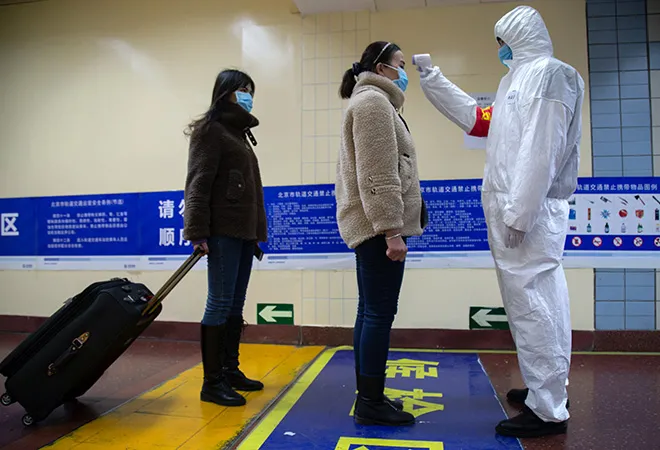-
CENTRES
Progammes & Centres
Location
Political leaders have already declared ‘war’ on the disease and such a framing typically precedes “extraordinary” invasive measures that slowly become ordinary. Will things return to normal when this pandemic subsides?

The shockwaves created by the microscopic SARS-CoV2 will be felt for years to come; analysts are already predicting a global recession, bemoaning the fragility of globalisation and declaring this the final nail in the coffin of open borders. With governments and societies taking extraordinary measures, aided by the blunt force of technology, to limit the spread of the virus, it is crucial to examine the precedents we may be creating.
On 3 August 2006, MI5 agents surveilling Londoners Abdulla Ahmed Ali and Tanvir Hussain heard the two making plans to smuggle hydrogen peroxide in soft drink bottles for a suicide mission involving a number of transatlantic flights. As a direct result, by October 2006, the EU and the US instated temporary restrictions on the kinds and quantity of liquids one can carry on flights. The tedious new regulations had The Times speculating that air travel will decline.
Nearly 14 years later, passenger volume has more than doubled, and we continue to carry our limited liquids in little transparent bags. Many passengers may not even remember a time when you could freely carry your water bottles through airport security, and even fewer remember when airport security itself was not a constant assault on one’s bodily privacy.
As of 23 March 2020, there are nearly 340,000 Covid19 cases worldwide and over 100 countries have partially or completely shut their borders. The rapid spread of the disease has created widespread panic, amplified by social media. In Beijing, video footage of a Chinese-Australian woman who went on a jog, followed by a name-and-shame campaign by Chinese netizens resulted in her being fired and forced to leave the country. In Taiwan, netizens posted the personal information of a man who hid details of his travel history from his employer. In India, singer Kanika Kapoor was harassed on social media after she tested positive for Covid19, a week after her return from London. On Twitter, users from around the world are posting videos and photos of individuals, some celebrating violence, under the hashtag #COVIDIOT.
Thermal screenings have become a mainstay at many airports and business establishments around the world. Indian airports have introduced new requirements as well, confiscating passports until passengers had been screened for Covid19. Businesses are already proposing innovative ways to invade an individual’s privacy in response to Covid. Bill Gates, during a Reddit AMA, proposed the creation of “digital certificates” so that business and governments can track “who has recovered or been tested recently or, when we have a vaccine, who has received it.”
The sheer scale and impact of Covid19 has elicited extreme measures, with states practically on war-footing. The Indian government invoked the Epidemic Diseases Act of 1897, an act once used by the British Raj to jail Bal Gangadhar Tilak for his newspapers’ critical coverage of the authorities’ handling of the plague pandemic. The United States has, similarly, invoked the Defense Production Act, an act that has its origins in the Korean War.
The securitisation of an issue creates new normal and an ever-expanding set of restrictions based on unquantifiable future threats. Ole Weaver defined securitisation as a speech act that “moves a particular development into a particular area and claims a special right to use whatever means necessary to block it.” Securitisation therefore enables those in power to “gain control” over an issue, its framing and its response.
Political leaders have already declared ‘war’ on the disease and such a framing typically precedes “extraordinary” invasive measures that slowly become ordinary. Will things return to normal when this pandemic subsides? We may well be headed toward a world where more invasive health screenings become ‘normal’, where employers can check your entire health history through an Aadhar-like digital certificate, where it is acceptable to expose the personal information of people online for a disease they may have no control over, where governments and citizens laud violent action against individuals with no power. “Has history ever shown that once the government has surveillance tools, it will maintain modesty and caution when using them?”, says Chinese scholar Hu Yong. As we slowly head down this spiral, we should be asking ourselves whether we will accept the creation of new tools of surveillance and suppression.
The views expressed above belong to the author(s). ORF research and analyses now available on Telegram! Click here to access our curated content — blogs, longforms and interviews.

Trisha Ray is an associate director and resident fellow at the Atlantic Council’s GeoTech Center. Her research interests lie in geopolitical and security trends in ...
Read More +